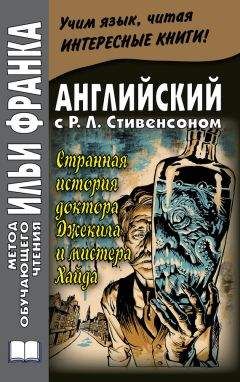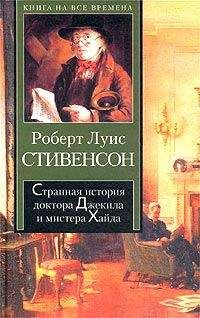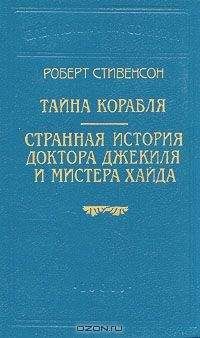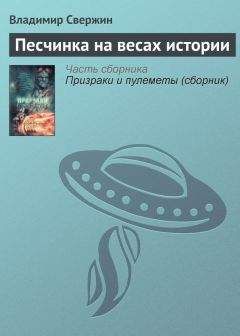Robert Stevenson - Английский язык с Р. Л. Стивенсоном. Странная история доктора Джекила и мистера Хайда
tincture ['tINktSq] investigation [In"vestI'geIS(q)n] sanity ['sxnItI] impediment [Im'pedImqnt] cerebral ['serIbrql] disease [dI'zi:z]
Here were a phial of some tincture, a paper of some salt, and the record of a series of experiments that had led (like too many of Jekyll's investigations) to no end of practical usefulness. How could the presence of these articles in my house affect either the honour, the sanity, or the life of my flighty colleague? If his messenger could go to one place, why could he not go to another? And even granting some impediment, why was this gentleman to be received by me in secret? The more I reflected, the more convinced I grew that I was dealing with a case of cerebral disease; and though I dismissed my servants to bed, I loaded an old revolver, that I might be found in some posture of self-defence.
Twelve o'clock had scarce rung out over London (едва над Лондоном раздался /бой часов, возвещавший/ полночь), ere the knocker sounded very gently on the door (как уже послышался осторожный /стук/ дверного молотка /по двери/). I went myself at the summons (я сам отправился /ответить/ на зов), and found a small man crouching against the pillars of the portico (и обнаружил невысокого человека, жавшегося к колоннам портика; to crouch — припадать к земле; согнуться, сжаться).
"Are you come from Dr. Jekyll (вы явились от доктора Джекила)?" I asked.
He told me "yes" by a constrained gesture (он сказал мне "да" судорожным жестом = он судорожно кивнул; constrained — вынужденный; скованный, неестественный /о движении/); and when I had bidden him enter (а когда я пригласил его войти), he did not obey me without a searching backward glance into the darkness of the square (он, прежде чем последовать за мной, бросил в темноту площади пытливый взгляд через плечо; toobey— слушаться, повиноваться; следовать, подчиняться /чему-либо/; searching— тщательный; изучающий, проницательный). There was a policeman not far off (невдалеке находился полицейский), advancing with his bull's eye open (который двигался в нашу сторону с горящим сигнальным фонарем; bull's-eye— «бычий глаз»: стеклянный шар /который образуется при выдувании стекла/; сигнальный фонарь); and at the sight, I thought my visitor started and made greater haste (завидев его, мне показалось, что мой гость вздрогнул и поспешил /зайти в дом/; tostart— отправляться в путь; вздрагивать, пугаться; haste — спешка).
knocker ['nOkq] crouch [krautS] pillar ['pIlq] portico ['pO:tIkqu] constrained [kqn'streInd] gesture ['dZestSq]
Twelve o'clock had scarce rung out over London, ere the knocker sounded very gently on the door. I went myself at the summons, and found a small man crouching against the pillars of the portico.
"Are you come from Dr. Jekyll?" I asked.
He told me "yes" by a constrained gesture; and when I had bidden him enter, he did not obey me without a searching backward glance into the darkness of the square. There was a policeman not far off, advancing with his bull's eye open; and at the sight, I thought my visitor started and made greater haste.
These particulars struck me, I confess, disagreeably (признаюсь, что эти подробности /его поведения/ произвели на меня неприятное впечатление); and as I followed him into the bright light of the consulting room (и пока я шел за ним в ярко-освещенный врачебный кабинет), I kept my hand ready on my weapon (я держал руку /наготове/ на револьвере; weapon — оружие). Here, at last, I had a chance of clearly seeing him (здесь, наконец, мне представилась возможность /отчетливо/ рассмотреть его). I had never set eyes on him before, so much was certain (я был совершенно уверен, что никогда его раньше не видел). He was small, as I have said (как я уже сказал, он был невысок ростом); I was struck besides with the shocking expression of his face (кроме того, я был поражен гадким выражением его лица; shocking — потрясающий; ужасающий; скандальный; отвратительный, гадкий), with his remarkable combination of great muscular activity (примечательным сочетанием большой мышечной активности; remarkable— замечательный, удивительный) and great apparent debility of constitution (и большой видимой/очевидной слабости телосложения), and — last but not least (и, последнее, но тем не менее важное: «последнее, но не наименьшее»; least /от little/ — малейший, минимальный, наименьший) — with the odd subjective disturbance caused by his neighbourhood (странной субьективной тревогой, вызванной его близостью;subjective— субъективный, личный; disturbance— нарушение равновесия; беспокойство, волнение, тревога; neighbourhood — близость, смежность, родственность; сопредельность, соседство; neighbour — сосед).
particular [pq'tIkjulq] weapon ['wepqn] muscular ['mAskjulq] debility [dI'bIlItI] disturbance [dIs'tq:b(q)ns]
These particulars struck me, I confess, disagreeably; and as I followed him into the bright light of the consulting room, I kept my hand ready on my weapon. Here, at last, I had a chance of clearly seeing him. I had never set eyes on him before, so much was certain. He was small, as I have said; I was struck besides with the shocking expression of his face, with his remarkable combination of great muscular activity and great apparent debility of constitution, and — last but not least — with the odd subjective disturbance caused by his neighbourhood.
This bore some resemblance to incipient rigor (это ощущение несколько напоминало легкое оцепенение; incipient — начинающийся, начальный), and was accomplished by a marked sinking of the pulse (и завершалось = сопровождалось явным замедлением пульса; marked — отмеченный; заметный, явный; to sink — тонуть; понижаться). At the time, I set it down to some idiosyncratic, personal distaste (в тот момент я приписал это некоей индивидуальной, личной неприязни; to set down — класть, ставить; приписывать/чему-либо/, объяснять/чем-либо/; idiosyncratic — отличительный, характерный, уникальный; идиосинкратический/болезненно чувствительный к чему-либо, активно не принимающий что-либо/), and merely wondered at the acuteness of the symptoms (и просто подивился остроте симптомов; acute — остроконечный, острый; острый, сильный); but I have since had reason to believe (но с тех пор у меня появился повод поверить) the cause to lie much deeper in the nature of man (что причина лежит = кроется гораздо глубже, в характере этого человека) and to turn on some nobler hinge than the principle of hatred (и вращается на более благородном шарнире, чем на принципе ненависти; hinge — шарнир, двернаяпетля; суть, стержень).
incipient [In'sIpIqnt] rigor ['rIgq] idiosyncratic ["IdIqsIN'krxtIk] symptom ['sImptqm] principle ['prInsIp(q)l]
This bore some resemblance to incipient rigor, and was accomplished by a marked sinking of the pulse. At the time, I set it down to some idiosyncratic, personal distaste, and merely wondered at the acuteness of the symptoms; but I have since had reason to believe the cause to lie much deeper in the nature of man and to turn on some nobler hinge than the principle of hatred.
This person (этот человек) (who had thus, from the first moment of his entrance (который таким вот образом, с самого первого момента своего появления), struck me what I can only describe as a disgustful curiosity (произвел на меня такое впечатление, которое я могу описать только как смесь отвращения и любопытства; disgust— отвращение; disgustful curiosity— отвратительное любопытство; любопытство, смешанное с отвращением)) was dressed in a fashion that would have made an ordinary person laughable (был одет так, что любой другой /в такой одежде/ выглядел бы смехотворно; fashion — образ, манера, вид; ordinary person— обычный человек, зд. любой другой); his clothes, that is to say, although they were of rich and sober fabric (а именно, его одежда, хотя и была сшита из дорогой и неяркой = темной материи; sober — трезвый; спокойный, мягкий/оцвете/), were enormously too large for him in every measurement (была чрезвычайна велика ему по всем меркам; measurement — измерение; размеры) — the trousers hanging on his legs (брюки болтались на ногах; to hang — вешать; болтаться) and rolled up to keep them from the ground (и были подвернуты, чтобы не волочиться по земле: «чтобы удерживать их от земли»; to roll up — скатывать, свертывать; to keep from smth. — удерживатьсяотчего-либо), the waist of the coat below his haunches (талия его пиджака располагалась ниже бедер), and the collar sprawling wide upon his shoulders (а воротник широко раскинулся по плечам; to sprawl /out/ — расползаться /во все стороны/).




